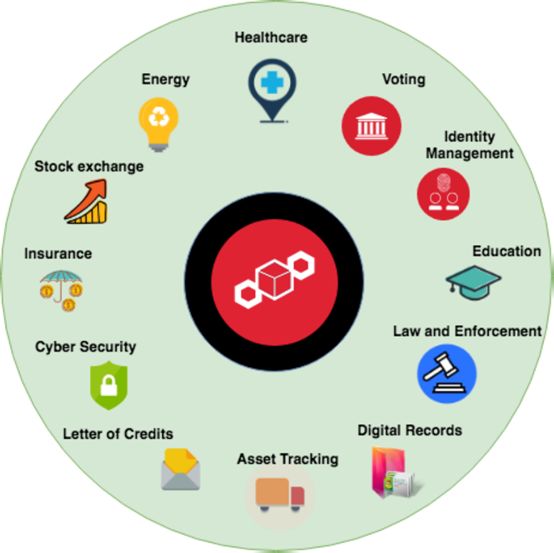Overview of blockchain application cases: health care and energy industry
Bitcoin is an encrypted digital currency that trades through open, public and anonymous blockchain networks. Then people realized that the technology can be applied to different fields, such as health care, voting, identity management, governance, supply chain, energy and so on.
In addition, some experts predict that blockchains may affect digital domains similar to the Internet. When the Internet first appeared, people didn't know how it would change our lives. From smartphones and text messages, to live video with friends, and video conferencing or live streaming, no one knows that the invention of the Internet will change the world.
We are currently in the early stages of the blockchain and there is still a lot of potential that has not yet been released. The figure below represents some of the application areas of the blockchain proposed by various experts.
In this article we discuss some of the blockchain application cases presented by global researchers.
- Internal and external, Libra can seek hope in the crack
- A text saying that IPFS: What is the expectation of Filecoin?
- The judge made a favorable Bitfinex ruling and rejected the file request filed by NYAG

Health care
Distributed ledger technology has the potential to enhance medical services. Blockchains can be used for drug traceability and patient data management.
Counterfeit drugs are a major problem in the pharmaceutical industry. According to a report by the Health Research Funding Organization, between 10% and 30% of medicines sold in developing countries are related to counterfeit medicines. According to estimates by the World Health Organization, 16% of counterfeit drugs are wrong, and 17% of counterfeit ingredients are inaccurate. Therefore, these drugs may not be able to treat the disease, but may cause side effects that may lead to death, and thus may endanger the patient's life. From an economic point of view, the annual loss of counterfeit drugs to European pharmaceutical organizations is 10.2 billion euros.
The blockchain can be used as a solution to this problem because all transactions added to the distributed ledger are immutable and have a digital timestamp so that the product can be tracked and the information can be prevented from being tampered with.
In addition, managing the integrity of patient data is one of the major issues in the healthcare industry. Each patient's physical condition is different, so the treatment strategy for common diseases will vary depending on the situation. Therefore, in order to provide personalized treatment, a complete medical history of a single patient must be accessed. However, medical data is sensitive and requires a secure sharing platform.
The existing bookkeeping medical record system lacks privacy and interoperability. Blockchain can provide an infrastructure for integrating medical records and data integrity functions across different healthcare organizations through different types of ledger technologies.
The blockchain creates a powerful and secure transparent framework for storing digital medical records, delivering superior service to patients and reducing treatment costs. B Shen et al. proposed a license-chain-based framework called MedChain, which is based on the Hyperledger Fabric and provides patients with complete control over their medical records.
Patients can use this distributed storage platform to share their health information to a doctor or health center. Deloitte also published a paper on health care opportunities through blockchain-based solutions (2016). Describes how to reduce interoperability in the healthcare system by using smart contracts and eliminating intermediaries to reduce additional costs and make the system more robust.
2. Energy industry
One of the main uses of blockchains in energy-related applications is the microgrid. A distributed localized power and load set for a microgrid designed to increase the efficiency and reliability of energy production and consumption. The power source can be a distributed generator, a renewable energy station, and an energy storage component in a facility created and owned by a different organization or energy provider. One of the main advantages of microgrid technology is that it not only enables residents and other power consumers, such as factories, to obtain the energy they need, but also produces and simplifies energy consumption for the grid. Blockchains can be used to facilitate, record, and verify power trading transactions in the microgrid.
In a similar manner, blockchains can be used on a larger scale to enable energy trading in the smart grid. In smart grids equipped with two-way communication streams, blockchains can be used to support energy consumption monitoring and energy trading for security and privacy maintenance without the need for intermediaries.
Smart contracts can be used to ensure a program description of the degree of expected power flexibility. The effectiveness and manageability of demand response agreements, as well as the balance between power demand and generation. In addition, blockchains can be used to implement energy trading in the Industrial Internet of Things (IIoT). Often, using blockchains for energy-related applications has the potential to reduce energy costs and increase resiliency.
Source: Gemi chain
We will continue to update Blocking; if you have any questions or suggestions, please contact us!
Was this article helpful?
93 out of 132 found this helpful
Related articles
- Monthly Report | September Domestic and Foreign Blockchain Policy: Virtual Currency Mining Supervision Strengthens Legal Digital Currency Multi-Country Support
- Zuckerberg "Second Palace" attends the hearing Libra can break through the blockade
- September public chain observation: How to treat Bitcoin mining after the market?
- How to create an encrypted startup, you need to avoid the minefield
- Investment management company VanEck: Bitcoin is a great tool for diversifying your portfolio
- CFTC Chairman: ETH is not a security, it is a commodity; the forked asset should be classified into the same category as the original asset.
- The United Nations has set up a cryptocurrency fund to accept bitcoin and Ethereum donations.





